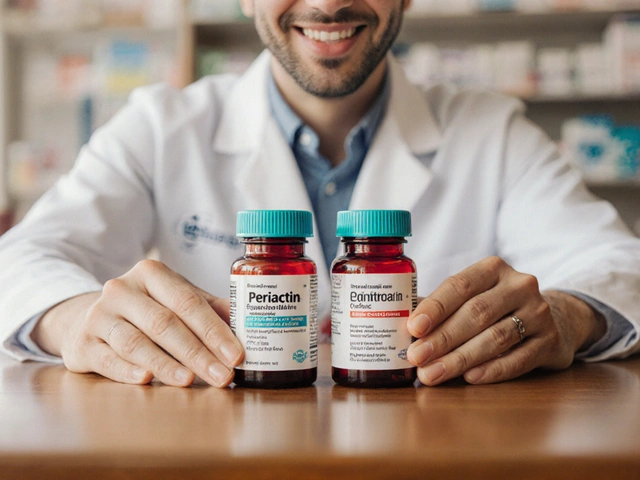Levothyroxine is one of the most commonly prescribed medications in the UK and the US - over 260 million packs were dispensed in the UK between 2016 and 2020 alone. For millions of people with hypothyroidism, it’s life-changing. But it’s not a simple ‘take one pill and forget it’ situation. Getting the dose right matters. Too little, and fatigue, weight gain, and brain fog stick around. Too much, and you risk heart palpitations, bone loss, or even atrial fibrillation. The difference between feeling fine and feeling awful often comes down to one thing: monitoring.
Why Levothyroxine Isn’t Like Other Pills
Levothyroxine replaces the thyroid hormone your body no longer makes. It’s not a painkiller or an antibiotic. It’s a hormone. And hormones? They affect everything - your metabolism, heart rate, body temperature, mood, even how fast you digest food. That’s why the dose needs to be precise. The therapeutic window is narrow. A 12.5 microgram difference - less than half a pill - can push someone from feeling normal to feeling anxious and shaky.Many people assume once they’re on levothyroxine, they’re set for life. That’s not true. Your body changes. You age. You gain or lose weight. You start or stop other meds. Even small shifts in your health can change how much levothyroxine you need. Studies show 15-20% of patients need a dose adjustment every year. If you’re not being monitored, you’re essentially flying blind.
How Often Should You Get Tested?
The guidelines are clear, but too many GPs ignore them. After starting levothyroxine or changing your dose, you should get a TSH blood test in six weeks. Not three months. Not when you next see your doctor. Six weeks. That’s when your body stabilizes after a dose change.Once your TSH is stable - meaning two tests, three months apart, are both in range - you can drop to once a year. But here’s the catch: stable doesn’t mean perfect. Some people feel awful even with a ‘normal’ TSH. That’s when Free T4 testing becomes important. If you’re still tired, gaining weight, or depressed despite a normal TSH, ask for a Free T4 check. It gives a fuller picture.
Special cases need more attention. Pregnant women? Test every 4-6 weeks in the first half of pregnancy, then again at 26-32 weeks. Older adults with heart disease? Slower adjustments - 12.5 to 25 microgram changes every 6-8 weeks. Anyone on amiodarone, lithium, or iron supplements? Extra vigilance. These drugs interfere with how levothyroxine is absorbed or used.
The Hidden Danger: Brand Switching
You might not realize this, but your pharmacist can legally switch your levothyroxine brand without telling you. Generic versions are cheaper, so pharmacies do it all the time. But here’s the problem: even though the dose says ‘100 mcg’, different brands absorb slightly differently in your body. The FDA and EMA require them to be bioequivalent - 90-110% of the original. Sounds fine, right? But for a hormone with a narrow window, 10% variation can be enough to throw you off.The UK’s MHRA recorded 335 adverse reports between 2015 and 2019 linked to brand switching. Symptoms? Fatigue (78%), headaches (65%), anxiety (47%), palpitations (39%). In 47 of those cases, healthcare professionals reported the issue. And here’s the kicker: only 27 of those 335 cases had thyroid tests done. That means most people were suffering, and no one checked if their hormone levels had changed.
Patients on forums like Thyroid UK report that 68% of those who switched brands experienced new or returning symptoms - even though the pill looked the same and had the same number on it. If you’ve ever felt worse after a pharmacy refill, it might not be in your head. It might be your brand.

How to Protect Yourself
You can’t control everything, but you can control a few key things:- Ask your doctor to specify ‘brand name’ or ‘do not substitute’ on your prescription if you’ve ever had issues after a switch. Many GPs don’t know they can do this - but they can.
- Take it on an empty stomach. At least 30-60 minutes before breakfast. Coffee, calcium, iron, antacids, and even soy milk can block absorption. Take them at least 4 hours apart.
- Keep a symptom journal. Write down energy levels, weight changes, mood swings, heart rate. Bring it to appointments. Numbers on a lab report don’t tell the whole story - your experience does.
- Insist on testing. If your doctor says ‘you’re fine, no test needed’, ask why. If they refuse, ask for a referral to an endocrinologist. You have the right to be monitored.
What Happens If You’re Under- or Over-Treated?
Under-treatment feels like hypothyroidism: constant tiredness, weight gain, cold intolerance, depression, dry skin, hair loss. If you’ve been on levothyroxine for years and still feel this way, your dose might be too low. Don’t assume it’s just ‘aging’ or ‘stress’.Over-treatment mimics hyperthyroidism: rapid heartbeat, anxiety, tremors, trouble sleeping, unexplained weight loss, muscle weakness. In older adults, it can trigger heart rhythm problems. Long-term over-treatment increases bone loss risk - especially in postmenopausal women.
Neither is acceptable. Both are preventable with proper testing. The goal isn’t just a ‘normal’ TSH. It’s feeling well. If your TSH is 2.5 but you’re exhausted, that’s not success. If your TSH is 0.8 and you’re jittery, that’s not success either.
Who Needs Special Care?
Not everyone gets the same monitoring. These groups need extra attention:- Pregnant women - thyroid needs jump 30-50% in early pregnancy. Untreated, it raises risks for miscarriage, preterm birth, and developmental delays in the baby.
- People over 65 - TSH targets are higher. A TSH of 5.5 might be fine for an 80-year-old with heart disease, but not for a 30-year-old.
- Those with heart disease - dose increases must be slow. Too fast can trigger angina or arrhythmias.
- Patients on amiodarone, lithium, or iron supplements - these interfere with thyroid function or absorption. Coordination with a specialist is essential.
If you fall into any of these groups and aren’t seeing an endocrinologist, ask why. Primary care can manage simple cases - but complex ones need specialist input.
The Bigger Picture
The NHS data shows only 58% of practices follow recommended monitoring schedules. Over a third of patients go more than 18 months without a TSH test. That’s not negligence - it’s systemic. GPs are overloaded. Testing isn’t always automated. Patients don’t always push back.But you can change that. Be your own advocate. Know your numbers. Know your symptoms. Know your rights. Levothyroxine is safe - when it’s managed right. But safety doesn’t happen by accident. It happens because someone - maybe you - asks the right questions, demands the right tests, and refuses to accept ‘it’s fine’ when it’s not.
Thyroid medication isn’t about fixing a broken part. It’s about restoring balance. And balance takes attention. Not just from your doctor - from you.
Can I switch levothyroxine brands without telling my doctor?
No - not without risk. Even though brands are considered bioequivalent, small differences in absorption can cause symptoms like fatigue, anxiety, or palpitations. If you’ve ever felt worse after a pharmacy refill, it might be due to a brand switch. Ask your doctor to write ‘do not substitute’ on your prescription if you’ve had issues before.
How long after taking levothyroxine can I eat or drink coffee?
Wait at least 30 to 60 minutes after taking levothyroxine before eating or drinking anything except water. Coffee, milk, calcium, iron, and antacids can block absorption. If you take supplements or medications like omeprazole or cholesterol drugs, space them at least 4 hours apart.
Is a normal TSH enough to feel well on levothyroxine?
Not always. Some people feel awful even with a TSH in the normal range. If you’re still tired, gaining weight, or depressed, ask for a Free T4 test. Your symptoms matter as much as your lab results. A ‘normal’ number doesn’t mean you’re optimally treated.
How often should I get my thyroid levels checked?
After starting or changing your dose, get tested in 6 weeks. Once stable (two TSH tests 3 months apart in range), you can go to once a year. But pregnant women, older adults, or those with heart disease need more frequent testing - sometimes every 4-6 weeks. If you’re not feeling right, don’t wait for your annual test - ask for one sooner.
Can levothyroxine cause heart problems?
Yes - but only if the dose is too high. Over-treatment can lead to rapid heartbeat, atrial fibrillation, or increased risk of heart attack, especially in older adults or those with existing heart disease. That’s why dose adjustments must be slow and careful in these groups. Always report palpitations, chest tightness, or shortness of breath to your doctor immediately.
Do I need to take levothyroxine for life?
For most people with hypothyroidism, yes. The condition is usually permanent. But the dose may change over time due to aging, weight changes, pregnancy, or other medications. Lifelong doesn’t mean static - it means ongoing monitoring. Don’t assume your dose from 10 years ago is still right.








so i switched brands last month and now i’m constantly tired and my heart feels like it’s trying to escape my chest… i thought it was stress or caffeine but then i read this and realized maybe it’s the damn pill. no one ever told me pharmacies can switch brands without asking. what even is this system? i feel like a lab rat.
you’re not alone!! 😊 i had the exact same thing happen last year. switched from Tirosint to generic and suddenly i couldn’t get out of bed. took me 3 months to convince my doctor to test my Free T4 - turns out my levels were way off. now i have ‘do not substitute’ on my script and i’m finally sleeping again. you got this!! 💪
How anyone can be this careless with hormone regulation is beyond me. This isn’t aspirin. You’re not ‘taking a pill’ - you’re tinkering with your entire metabolic architecture. If you’re too lazy to monitor your TSH annually, don’t blame the system. Blame yourself for treating your body like a disposable appliance.
Let’s be real - the pharmaceutical-industrial complex is engineering this chaos. Bioequivalence? Ha. The FDA’s ‘90-110%’ standard is a joke when you’re talking about a hormone that regulates your soul. And don’t get me started on how the NHS outsources everything to the lowest bidder. They don’t care if you’re depressed, anxious, or in cardiac distress - they care about the bottom line. You’re a profit margin with a thyroid.
I’ve been on levothyroxine for 12 years. I’ve had five different brands. Each switch felt like a new form of torture. I keep a spreadsheet. I track everything. And I refuse to let my doctor dismiss my symptoms as ‘psychosomatic.’ They’re not. They’re pharmacological.
Hi everyone - I just want to say how brave it is to share these stories. You’re not alone. If you’re feeling off, it’s not ‘all in your head.’ Your body is talking. And if your doctor isn’t listening, find someone who will. You deserve to feel well. I’ve helped dozens of people navigate this - DM me if you need help asking for the right tests. You’ve got this. ❤️
Oh here we go. Another ‘thyroid trauma’ thread. People think they’re special because they’re tired? Newsflash: everyone’s tired. Maybe you’re just not sleeping enough or eating too much sugar. Stop blaming the pill and start taking responsibility for your life.
Let me cut through the noise. If you’re not getting tested every 6 weeks after a dose change, you’re not being treated - you’re being experimented on. And if your GP won’t order Free T4? Fire them. Endocrinologists aren’t luxury services - they’re essential. I’ve seen people go years without proper care. It’s criminal. And yes, brand switching is a silent epidemic. The system is broken. Don’t wait for permission to advocate for yourself.
My cousin’s friend’s neighbor switched brands and got cancer. Not thyroid cancer - lung cancer. She said it was because the new pill had ‘chemicals’ in it. I don’t know if it’s true but I’m scared now. I only take the brand my doctor gave me. No generics. No switching. Ever. I don’t trust anything anymore.
From a clinical endocrinology standpoint, the bioequivalence range of 80-125% (per EMA guidelines) is indeed problematic for narrow-therapeutic-index drugs like levothyroxine. The intra-individual variability in absorption can exceed 20% due to gastric pH, motility, and food interactions - which is why TSH monitoring is non-negotiable. Moreover, the MHRA’s pharmacovigilance data is underreported; real-world adverse event rates are likely 3-5x higher. Free T4 should be mandatory in symptomatic patients regardless of TSH - a point consistently ignored in primary care protocols.
Thank you for writing this. I’ve been on levothyroxine for 17 years. I’ve had doctors tell me I’m ‘fine’ with a TSH of 4.8 while I’m crying on the bathroom floor from exhaustion. I started tracking my symptoms, asking for Free T4, and insisting on consistency with my brand. It took years. But I’m finally feeling like myself again. You don’t need to be a medical expert to know when something’s off. Trust your body. Demand better. And if you’re reading this and still feeling tired? You’re not broken. You’re just waiting for someone to listen. You’re not alone.